Related Research Articles

Dottie West was an American country singer and songwriter. She also had several credits as an actress. A distinguished figure in the country genre, West was among several people who helped to elevate the platform of female country artists. She was also known for mentoring up-and-coming artists and being the first woman to win a country music accolade from the Grammy Awards.
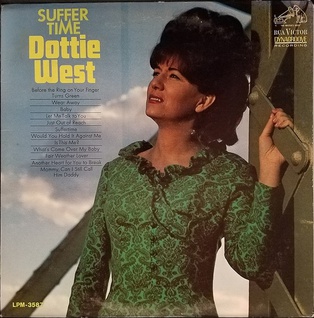
Suffer Time is a studio album by American country music artist Dottie West. It was released in July 1966 on RCA Victor Records and was produced by Chet Atkins. It was West's third studio album as a music artist and was her first concept album in her career. The record's concept focused on themes related to heartbreak and lost love. It included new compositions and cover versions of other recordings. These recordings included four singles, including the top ten hit "Would You Hold It Against Me". Suffer Time would become one of West's most successful and highest-selling albums in her career.

With All My Heart and Soul is a studio album by American country music artist Dottie West. It was released in January 1967 on RCA Victor Records and was produced by Chet Atkins. It was West's fourth studio album as a recording artist after having her first major hit in 1964. The album included 12 tracks, including the single "Paper Mansions". The song became a top ten hit on the Billboard country chart following its release. The album itself would also chart on a similar Billboard country albums survey.

Here Comes My Baby is a studio album by American country music artist Dottie West. It was released in June 1965 on RCA Victor Records and was produced by Chet Atkins. It was West's debut studio album as a recording artist and was issued following the success of the title track in 1964. The latter song won a Grammy Award in early 1965 which prompted the issue of the album. Here Comes My Baby would start a series of studio recordings West would release for RCA.

I'll Help You Forget Her is a studio album by American country music artist Dottie West. It was released in November 1967 on RCA Victor and was produced by Chet Atkins. West's seventh studio effort, I'll Help You Forget Her was also her fourth studio offering in 1967. It included the single "Like a Fool", which became a major hit. The album itself would reach peak positions on national publication charts.

Country Girl is a studio album by American country music artist Dottie West. It was released in August 1968 on RCA Victor Records and was produced by Chet Atkins. The project was West's ninth studio album and second to be released in 1968. The album consisted of 12 tracks, which contained new recordings and cover versions. The album's title track became a major hit in 1968 and would later be a signature song for West.
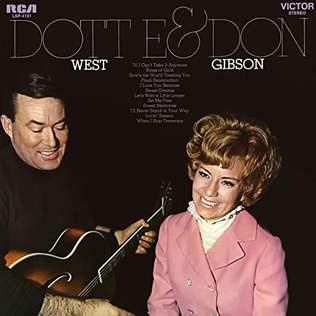
Dottie and Don is a studio album by American country music artists Don Gibson and Dottie West. It was released in March 1969 on RCA Victor Records and was produced by Chet Atkins and Danny Davis. The album was a collection of duet recordings between Gibson and West. It was both artists first album of duets to be recorded. Among the songs from the project, "Rings of Gold" became a major hit in 1969.
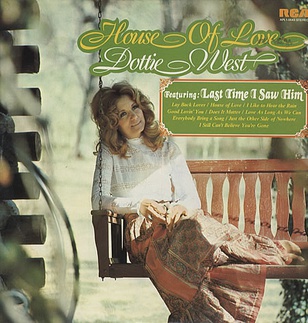
House of Love is a studio album by American country music artist Dottie West. It was released in May 1974 on RCA Victor Records and was produced by Billy Davis. It was West's 22nd studio recording in her music career and contained ten tracks. Among its singles was the song "Last Time I Saw", which became a top ten hit in 1974.
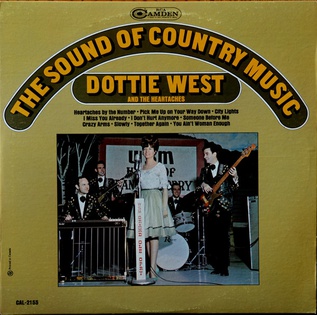
The Sound of Country Music is a studio album by American country music artist Dottie West and her band, "The Heartaches". It was released in February 1967 on RCA Camden Records. The sessions were co-produced by Chet Atkins and Ethel Gabriel. The project was West's fifth studio effort and first for the RCA Camden label. The album did not produce any singles nor reach peak positions on national charts. It was instead a collection of cover songs previously recorded by others.

The singles discography of American country artist Dottie West contains 59 singles released as a solo artist, 12 singles released as a collaborative artist, 3 promotional singles and 1 other charting song. West signed with RCA Victor Records in 1963, having her first Top 40 hit the same year. It was followed in 1964 by "Love Is No Excuse", a duet with Jim Reeves that became West's first top 10 hit. In 1964, she also released "Here Comes My Baby". The song reached number 10 on the Billboard Hot Country Singles chart and became the first song by a female country artist to win a Grammy award. From her 1966 album, West issued four singles, including the top 10 hits "Would You Hold It Against Me" and "What's Come Over My Baby". Over the next two years she had major hits with "Paper Mansions", "Like a Fool", "Country Girl", and "Reno". In 1969, West collaborated with Don Gibson on "Rings of Gold", which reached number 2 on the Billboard country chart. In 1973, she released a single version of a commercial jingle originally used by The Coca-Cola Company. Entitled "Country Sunshine", the song became West's biggest hit, reaching number 2 on the country songs chart and number 49 on the Billboard Hot 100. The song also nominated her for her eleventh Grammy. After releasing the top 10 hit "Last Time I Saw Him" (1974), West's chart hits declined and she was dropped from RCA in 1976.
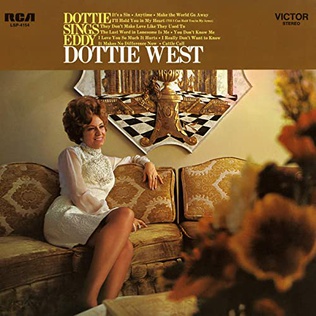
Dottie Sings Eddy is a studio album by American country music artist Dottie West. It was released in March 1969 on RCA Victor Records. The album was co-produced by Chet Atkins and Danny Davis. The project was a tribute to country artist, Eddy Arnold, whom West considered an inspiration in her career. West covered 11 tracks that were originally recorded by Arnold throughout his career.
"Let Me off at the Corner" is a song written by Lou Meredith and Larry Kronberg, and recorded by American country music artist Dottie West. It was released in August 1963 and became the first single to chart in West's music career, reaching the top 40 of the American country chart.
"Didn't I" is a song written and recorded by American country music artist Dottie West. It was released in November 1964 as the second single from the album Here Comes My Baby. The song became the fourth single to chart in West's music career, reaching the top 40 of the American country chart.
"No Sign of Living" is a song written by Mirriam Eddy, also known as Jessi Colter, and recorded by American country music artist Dottie West. It was released in July 1965 as the second single from the album Dottie West Sings. The song became a top 40 chart single on the US country music chart.
"Before the Ring on Your Finger Turns Green" is a song written by Felice and Boudleaux Bryant, and recorded by American country music artist Dottie West. It was released in November 1965 as the first single from the album Suffer Time. The song became a top 40 chart single on the US country music chart.
"Childhood Places" is a song written by Barry Mason and Les Reed, and recorded by American country artist Dottie West. It was released in November 1967 and became a top 40 chart single on the US country music chart. It was among a series of top 40 single releases by West during the 1960s. It was given positive reviews by critics and publications.
"It's Dawned on Me You're Gone" is a song written by Hank Cochran and Red Lane, and recorded by American country music artist Dottie West. It was released in July 1970 as the first single from the album Country and West. The song became a top 40 chart single on the US country music chart. It was given positive reviews by Billboard and Cashbox following its release.

"If It's All Right with You" is a song written by Kenny O'Dell and Larry Henley, and recorded by American country music artist Dottie West. It was released in October 1972 as the first single from the album If It's All Right with You/Just What I've Been Looking For. The song reached the top 40 of the US country chart and the top 100 of the US Hot 100. It was given positive reviews by Cashbox following its release.
"House of Love" is a song written by Kenny O'Dell, and recorded by American country music artist Dottie West. It was released in June 1974 as the second single and title track from the album House of Love. The song reached the top 40 of the US country chart. It was given positive reviews following its release.
"Lay Back Lover" is a song written by Rafe Van Hoy and Steve Pippin, and recorded by American country music artist Dottie West. It was released in November 1974 as the third single from the album House of Love. The song reached the top 40 of the US country chart. It was given positive reviews following its release.
References
- 1 2 ""Mommy Can I Still Call Him Daddy" by Dottie West: Track info". AllMusic . Retrieved 29 October 2023.
- ↑ Ankeny, Jason. "Dottie West Biography". AllMusic . Retrieved 29 October 2023.
- 1 2 3 4 West, Dottie (July 1966). ""Mommy, Can I Still Call Him Daddy"/"Suffertime" (7" vinyl single)". RCA Victor . 47-8900.
- 1 2 3 Adams, Greg. "Suffer Time: Dottie West: Songs, reviews, credits". AllMusic . Retrieved 29 October 2023.
- ↑ West, Dottie (July 1966). "Suffer Time (Liner Notes and Album Information)". RCA Victor . LSP-3587.
- ↑ "Country Reviews" (PDF). Cashbox . July 23, 1966. p. 44. Retrieved 30 October 2023.
- ↑ Whitburn, Joel (2008). Hot Country Songs 1944 to 2008. Record Research, Inc. ISBN 978-0-89820-177-2.
- ↑ "Dottie West Chart History (Hot Country Songs)". Billboard. Retrieved October 29, 2023.